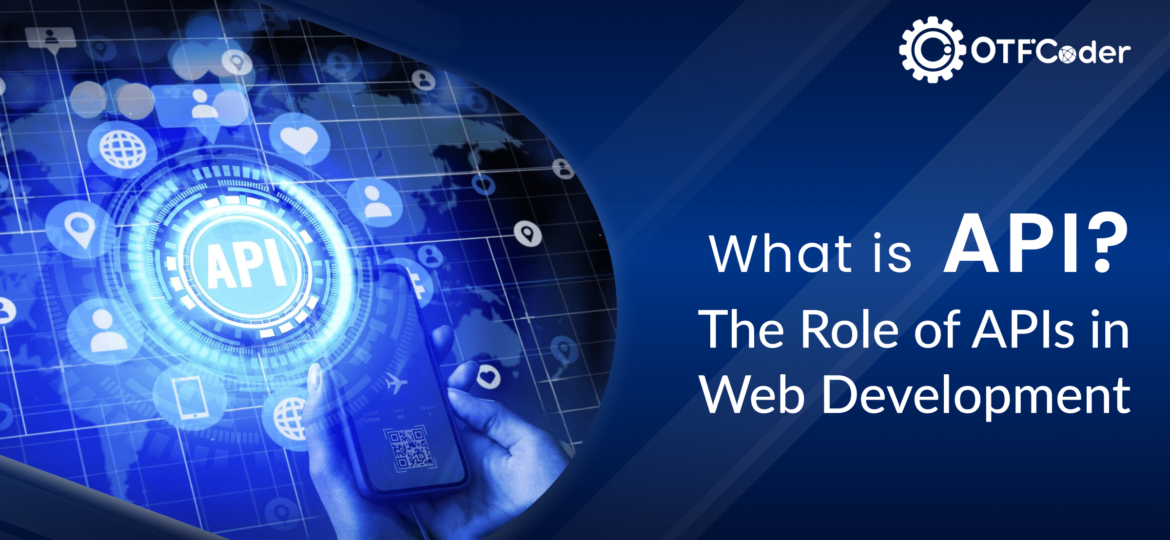What is API? The Role of APIs in Web Development

Within the ever-changing field of contemporary web development, the term “API” has evolved from technical vernacular to become an essential component of digital innovation. The unsung hero that powers smooth connectivity between various software programs and supports the functionality and interaction we encounter online is known as an application programming interface, or API. APIs have become the unsung heroes of the internet, helping to redefine the possibilities of digital interaction by facilitating communication between applications and services as it grows in scope and complexity.
Fundamentally, an API acts as a bridge, facilitating easy communication, data sharing, and functional exchange between disparate systems. It is the unseen thread that weaves through the complex web development fabric, allowing apps to flourish in a cooperative digital ecosystem in addition to coexisting. This investigation delves deeply into the fundamentals of APIs and reveals their importance in the field of web development, where they serve as enhancers of user experiences, efficiency, and innovation.
In this blog, we understand the fundamental principles of APIs, understand their diverse types, examine their inner workings, and uncover their pivotal role in shaping the landscape of contemporary web development. Let’s Understand what APIs actually mean in the constantly changing digital world.
What are APIs
An application programming interface, or API for short, acts as a bridge to facilitate communication between various software programs. APIs specify a collection of guidelines and procedures that permit smooth communication between various systems, promoting the sharing of information and features. By serving as bridges, these interfaces allow various software components to be connected and function as one whole.
Types of APIs
Different forms of APIs are available to meet different needs and scenarios in the digital world. Webhooks, Simple Object Access Protocol (SOAP) APIs, and Representational State Transfer (RESTful) APIs are some of the most widely used types. The simplicity and flexibility of RESTful APIs which make use of the principles of REST architecture have led to their increasing popularity. Conversely, SOAP APIs adhere to a stricter communication protocol. Real-time data delivery is made possible by webhooks, guaranteeing timely updates between apps.
How these APIs Work
The interchange of requests and answers is central to API functionality. An API’s interface receives requests for particular data or services from developers, processes them, and returns the pertinent data. Numerous web applications and services rely on this smooth communication process to function as their basis, enabling dynamic interaction and functional sharing.
The Role of APIs in Web Development
Encouraging Communication
Encouraging communication between various software components is one of the main functions of APIs in web development. Multiple applications and services coexist in a typical web ecosystem, and APIs allow them to seamlessly exchange functionalities and information. For example, to ensure that users have accurate and current information, a weather application may use APIs to retrieve real-time data from a weather service.
Increasing Functionality
APIs play a major role in making websites and applications more functional. Third-party APIs can be integrated by developers to add new features without having to start from scratch. This allows developers to take advantage of the knowledge and skills of specialized services while also saving time and money. For instance, a web developer does not need to create an internal payment system in order to enable secure online transactions through the integration of a payment gateway API.
Data Integration and Retrieval
When it comes to integrating data into online applications and getting it from outside sources, APIs are essential. A wide range of information can be accessed through APIs in the big data and connected services era. For example, social media platforms frequently offer application program interfaces (APIs) that let developers incorporate social features like showing a user’s most recent Facebook posts or tweets straight into their apps.
Enhancing the User Experience
An application’s or website’s user experience (UX) is crucial to its success. The utilization of APIs greatly enhances the user experience by permitting dynamic and interactive features. For instance, real-time traffic updates can be provided by a mapping application using APIs, giving users the most up-to-date information possible for their travels. These interactive components improve user happiness and engagement.
APIs and Web Development Services
APIs in Custom Development
APIs are essential for customizing solutions to satisfy particular needs in custom web development services. Custom APIs can be made by developers to facilitate communication between various parts of a custom application. The seamless alignment of the application’s functionalities with the particular requirements of the project or business is ensured by this customization.
Advantages for Companies that Develop Websites
When APIs are used strategically in projects, web development companies can benefit greatly. Because developers can integrate pre-built functionalities and services with APIs instead of having to start from scratch, faster development cycles are possible. This shortens the time it takes for web apps to go live by speeding up the development process overall. Furthermore, APIs enable scalability, allowing web development firms to grow and modify their offerings in response to changing client needs.
Problems and Solutions
Although APIs have many benefits, developers may encounter difficulties integrating them. Complications may arise from changes in API versions, security concerns, and compatibility issues. But with careful planning, frequent updates, and adherence to best practices, these difficulties can be lessened. To guarantee smooth integration, developers can, for instance, put safe authentication procedures in place and routinely keep an eye on API modifications.
Conclusion
In the field of web development, APIs have grown to be essential, acting as the foundation for improved user experiences, enhanced functionality, and smooth communication. The strategic use of APIs can greatly benefit web development companies, in particular, by streamlining development processes and providing their clients with dynamic, feature-rich applications. APIs, which present countless opportunities for creativity and cooperation, will surely play a key role in determining the future of web development services as the digital landscape continues to change.










